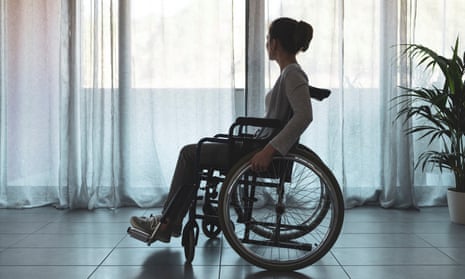Lucy Webster does a brilliant job of rewriting the narrative around care for disabled people, making it clear that such support is empowering for many (Some people think they would rather die than have help brushing their teeth – but care is not tragic, 6 June). I applaud her. And I envy her.
The narrative unfolding for me now is rather different. My own disability is new to me and growing. A few years ago, I was walking miles, climbing rocks, driving alone across Europe, working and playing hard. Now, I need sticks to cross a room and cannot stand up long enough to cook a meal. For me, care is a powerful symbol of what I am losing and how much harder my life is becoming.
Good care will not be easy to get. I am already overwhelmed and exhausted by the changes happening in my body; I can’t face the further effort that getting care will involve.
I also dread the loss of privacy that care will bring. I live alone and I like it that way. I don’t invite many friends round and I find strangers difficult. The mere thought of care workers in my home makes me cry.
I have, of course, experienced pity and condescension, but they are not the reactions I fear most. I know that I will need to prove I am “disabled enough”, and I know some people will disbelieve me. Such disbelief is devastating when you are already reeling with the shock and confusion of degenerative disease.
So I’d love to believe that “care is brilliant, fulfilling and life-enabling”. But I am mourning the physical changes that are leading me to need care, and I am overwhelmed by what I will need to do to get it. I need help with these things, perhaps even more than I need practical help. I can’t celebrate my need for care – not yet.
Fiona Weir
Huddersfield, West Yorkshire
Lucy Webster writes that, for many adults with a disability, “The choice is not between a life with care and a life without it, but between a life with care and no life at all.” She is right about this, and that the cared-for should not be pitied. Her experience, however, is dissimilar to most adults with severe disabilities, ie she has funding sufficient for flexible 24-hour care that facilitates an active life, and is in good enough health to be able to work.
In contrast, many adults with severe disabilities are unable to work and are reliant on care packages. Potentially housebound, they’re lucky if they have the necessary care package to enable them to keep body and soul together, and, if their maximum four calls out to their home every day still leave them at risk, they will find themselves with no choice but to accept 24-hour care (probably in an old people’s care home).
A report by the MS Society in 2017 found that 3,000 working-age adults in England were stuck in care homes for older people. The current figures on how many severely disabled adults find themselves in residential care remains hidden.
In 2019-20, 10 years into austerity and a matter of months before the effects of Covid-19 began to hit, local authorities received 560,000 requests for care support from disabled adults. In total, only 290,000 of them went on to receive long-term care and 28,000 received episodes of short-term care, according to the King’s Fund. Therefore, alongside Webster’s eulogy to the joys of care, there should also be a call for well-resourced, flexible, 24-hour care for all severely disabled adults, enabling them, like her, to live life well and not just survive.
Louise Hardwick School of law and social justice, Liverpool University
Molly Hardwick Master’s in social work student, York University
